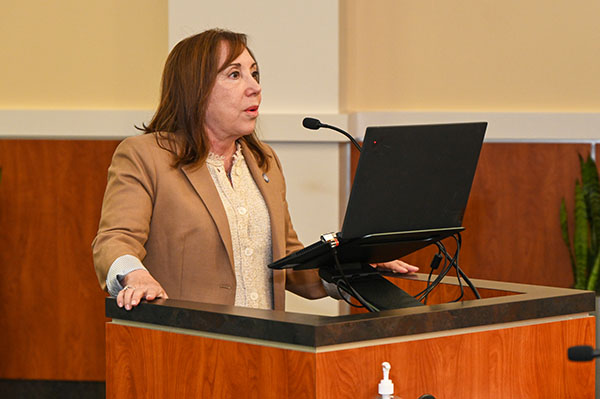
Florida’s state legislative session, still not quite done amid a budget standoff, nonetheless seems poised to erode local control on a variety of issues that concerned Wellington leaders, who received an update from State Sen. Lori Berman at the Wellington Village Council meeting Tuesday, May 13.
One example is banning fluoridation in the water supply, halting a practice Wellington has pursued for most of the last quarter century.
“Well, we passed a bill saying you can no longer fluoridate your water,” said Berman, a Democrat representing parts of central Palm Beach County and the recently elected minority leader. “Very upset about that.”
Gov. Ron DeSantis indicated he would sign the ban, which was included in a farm bill, making Florida the second state to forbid fluoridation after Utah.
Berman said in her view, the worst bill of the session will make it more difficult to put citizen initiatives on the ballot. It imposes felony penalties among stiffer regulations on volunteers gathering signatures, ramps up costs on sponsors and renders the process so expensive that only big corporations can afford it, as she sees it. DeSantis signed the measure, citing fraud concerns in the signature-gathering process.
Mayor Michael Napoleone said that the overall thrust coming from the state capital continues to erode the authority of local governments and undermine grassroots initiatives.
“It’s continuing to take away local control over land use and public safety,” Napoleone said.
He lamented constraints on citizen ballot initiatives that have been allowed since 1968, saying, “That is a terrible law that has been passed.”
Advocates for adding fluoride to municipal water supplies have long argued it safely helps prevent tooth decay, while critics have maintained it, among other things, poses a threat to intellectual development in children. The anti-fluoride side has gained momentum in the current federal administration.
It marks the latest development in a saga that has featured some twists and turns in the village over time.
Wellington authorities approved fluoridation in 1999. In 2014, the council moved to eliminate added fluoride, only to reauthorize it in 2016. It was reintroduced on May 15, 2017. The village raised the fluoride level through a process that involved the addition of a small amount of hydrofluosilicic acid in the drinking water supply.
Meanwhile, a bill giving school districts a way to opt out of mandated later start times for high schools and middle schools by 2026 passed both chambers. If signed by the governor, it would relieve some scheduling worries that emerged in public meetings, including one at Wellington High School last September.
The idea was to let older students get better rest, but concerns included disrupting after-school activities or possibly making elementary students start transportation in the dark during part of the year.
A 2023 law required that by 2026, all middle schools must begin no earlier than 8 a.m. and all high schools must start no earlier than 8:30 a.m. That would have rattled the schedule in Palm Beach County, where the most common start time for high schools is currently 7:30 a.m.
The sponsor of the State House version of the reform bill, HB 261, was former Wellington mayor and current State Rep. Anne Gerwig. A similar State Senate version, SB 296, ultimately passed both chambers.
In other business:
- The council voted 5-0 to change the land use in a comprehensive plan amendment for 363 acres that the village owns at 3491 Flying Cow Ranch Road from Palm Beach County Rural Residential to Wellington Conservation. It aligns the property more closely with environmental and passive recreational uses intended for the Wellington Environmental Preserve at the Marjory Stoneman Douglas Everglades Habitat, officials said.
- Also by a unanimous vote, the council approved ways to allocate in its budget $9.3 million collected in a recent code enforcement judgment against a developer. These were discussed during a recent council workshop. Some $6 million will be earmarked for an “environmental, resilience and open space” reserve, with $3.3 million going to the Acme Improvement District for improving water pumping stations.








Fluoride is ubiquitous in foods, beverages, medicines, absorbed from dental products, inhaled via ocean mist and air pollution. Fluoride is extremely high in tea, seafood, grape & soy products. No one needs fluoride because it isn’t a nutrient or essential for health teeth. But all agree that too much fluoride damages bone, brains and children’s developing teeth. Like all drugs, fluoride has adverse health effects http://FluorideAlert.org/issues/health
Total fluoride intake should be determined before prescribing more, reported former New York State Department of Health Dental Director and former American Dental Association Fluoridation Spokesperson, J. Kumar, He wrote: “Because of the availability of fluoride from multiple sources, practitioners should prescribe other forms of fluoride therapy based on an understanding of patients’ total exposure to fluoride and the need for it,” (NYS Dental Journal February 1998). Few dentists, if any including him, heed that advice.
So, now 70% of US children and adolescents are fluoride overdosed and afflicted with dental fluorosis (white spotted or yellow splotched teeth) while tooth decay is still epidemic Dentists profit from covering fluoride-damaged teeth as these advertisements attest to http://tinyurl.com/DentalFluorosisBeforeAfter
The American Dental Association concurs: “It also is critical that the dentist assess a child’s total fluoride exposure from all sources (beverages, food, toothpaste, supplements, topical applications and so forth…” (Journal of the American Dental Association 2014)
Never is fluoride intake tallied when communities are pressured to continue or start fluoridation. Legislators should know much fluoride children already ingest before feeding them more via their water supply, whether for or against fluoridation.
https://fluoridedangers.blogspot.com/2023/03/fluoride-abundant-in-foods-beverages.html